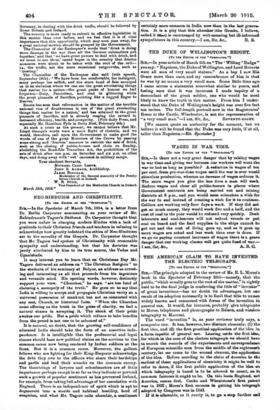NEO-HINDIIISM AND CHRISTIANITY.
[To Tee Soiree or as rrnsEcTaTOa"l Sea,—In the Spectator of March 7th. 1914, is a letter from Dr. Estlin Carpenter eommenting on your review of Mr. Rabindranai it Tstgors's :Mahone. Dr. Carpenter thought that you were unfair in charging modern Hindus with a lack of gratitude to their Ch ristian friends and teachers in refusing to acknowledge bow greatly indebted the ethic* of Neo.Elincluises are to the morality of the Gospels. Dr. Carpenter thought that Mr. Tagore bad spoken of Christianity with reasonable sympathy and understanding, but that his doctrine was justly attributed by him to its true source, the Vedas and Upanishads.
It may interest you to learn that on Christmas Day Mr. Tagore delivered an address on " The Christian Religion" to the students of Ilia seminary at Repos, an address as arrest- ing arid interesting as all that proceeds from his ingenious and versatile mind. His opening words, however, distinctly support your view. "Churches," he Gaye "are too fond of claiming a monopoly of the troth." He pea an to say that India is willing to accept and propagate Christian verity as a universal possession of mankind, but not as connected with any sect, Church, or historical facie. " When the Churches come offering ea the truth in the guise of charity, we feel a natural shame in accepting it. The shock of their pride awake. our pride. Buts pride which refuses to take benefits from the proud is not one to be ashamed of."
It is natural, no doubt, that the growing self-confidence of educated India should take the form of an assertive inde- pendence. It is intelligible that the professorial and legal chases should base new political claims on the ace-vices to the common cause now being rendered by Indian soldiers at the front. But it is a common cause. Moreover, the gallant fellows who are fighting for their King-Emperor acknowledge the debt they owe to the officers who share their bardshipe and perils and lead their attacks on the common enemy. The theorizings of lawyers and schoolmasters are of little importance perhaps except in so far as they indicate or portend suds a growth of popular sentiment aa has prevented Ireland, for example, from taking full advaritageof her association with England. There is an independence of spirit which is apt to degenerate into a sterile and habitual hostility, bred of IMapiciOn, and what Mr. Tager° calla alum/air, a.sentimeort certainly more common in India now than in the lest genera- tion. It is a pity that this &tarok-as, (the Greeks 1 believe. called it Op.) is encouraged by well-meaning but ill-informed
sympathizers in this country.—I am, Sir, &c., R. Pe






































 Previous page
Previous page